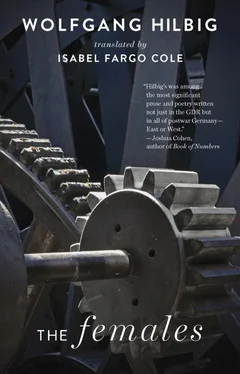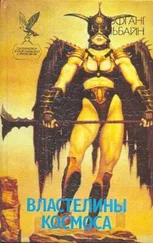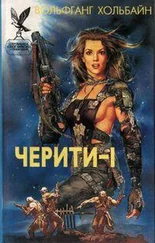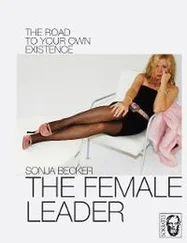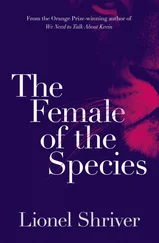No, each night the three words I’d invented were answered only by a cripple. — There was nothing in that trash can to interest me. Nothing to love—truly, the contents of that cylinder precisely matched those of the cornucopia left for me by the Republic for the purpose of my education. None of those contents could be unambiguously named. — It wasn’t long before I felt wretched again. In just five minutes I concluded I lacked the education to glimpse the females, even if they were still present, even if they existed by the millions. To see them it was too little to be blind in one eye, it was too little that I had some anatomical notion of them from the time my mother let me visit the circus as a child. — Already Lenin, as recorded by Clara Zetkin, had described wallowing in sexuality as a hobby of the intellectuals for which there was no place in the class-conscious proletariat; the adjective denoted a level of consciousness miles above my own. Resignedly, I turned away from the trash can and regarded my arm, still damp past the wrist; I looked at my fist, which opened helplessly, harmless and hopeless, as though there’d never be any place for it either.
And yet there had been something… I was already walking away, but now I retraced my steps… hadn’t I discovered a beautiful object in the trash can, yes, it seemed to me that inside the trash can yesterday I’d felt a kind of uterus. I lowered my hand in once more, seized a round, firm object that had a certain weight and that I could pull effortlessly from the jumble of hair, filth, wet substances, old clothes. I couldn’t see what I’d brought to light, for there were no lights on this dark street… or I saw only what I wanted to see. Even so, I thought I’d found something unmistakably female. But what? I cursed the town’s dysfunctional lighting, even Lady Luna dimmed her radiance as though to follow her lovely playmates. — What should I do? I was free, free and nameless; but, divested of reality, I could not do a thing.
If I was free, then I was free from reality— free , I felt the impact of the word sink in; the light I had seen was the flash of a stinging ideological slap in the face. — As of this morning I was free: let go from the factory, that is. The only outcome of this thought was that time collapsed back into its proper dimensions: early that morning, after a bitter altercation in which I’d threatened to thrash my boss, I’d been fired; right afterward I’d taken the bus to A. to complain about it at the labor office, and that evening I’d returned from A. Many things might have happened in that time, but my hours had filled up with repetitions and absurdities, absurd attempts at the speech I’d kept making all day, until ultimately I’d spoken in exactly the wrong place—assuming that wasn’t just a figment of my imagination—and I’d probably said exactly the wrong things. Oh, in that wrong place… which, naturally, was the right place for my destructivity… I might have slandered the females, might have chased them away, and now I finally had to face up to my idiocies. It was probably the very gaffes and idiocies of what I said that could be directly linked to my identity, my name, but my idiocies by themselves could hardly meet with sympathy in our republic’s bureaucracies. — I hereby request permission—I believed I’d started off—I request permission, effective immediately, to wear skirts, even outside the home, without facing a reprimand for indecent behavior. — I pondered whether I’d really spoken those words; the one single bottle clutched in my fist couldn’t have been enough to make me do it. — And without, say, being subjected to that famous reflexological Pavlovian therapy: I’m not a homosexual. Please make a note of that. And I’m not just trying to blasphemously shock a fatherland that has evidently had all of its female parts castrated, I’m trying to make sure that, following my dismissal from the factory, the only one I’d consider setting foot in, I won’t be carted off to a labor camp for antisocial behavior if the factory can’t hire me back. So it’s not just fetishistic foolishness that’s made me start collecting women’s clothing from the trash; I’m trying to finally dismiss the state security forces from my trouser’s fly, where their employees made themselves at home early on, I’m trying to finally give them their freedom. Somewhere out there in town are three words that must be ancient, written on a public wall where everyone can read them, addressed to Jack the Ripper , to whom in many ways I could probably be compared—or at least I belong, albeit by a strange coincidence, to a nationality of similar characters—thus those three words, in some tricky way, must also be addressed to me, or must have been at one time, and I’m anxious to assert my claim to that avowal on the wall without the labor office hindering me with terms and demands. Don’t ask me just who I think I am; I’m not fond of these kinds of polemics myself. But now that I lack the money to buy a ticket, I have to put on my own cabaret… oh, and I did so love the ladies’ revue. At least my idiocies, at this moment, help me realize that I have a right to those three words. —
Of course—I was pacing back and forth among the trash cans, seemingly sedate, but clenching my fists in disappointment—of course I hadn’t begun with any such tirade, it was too idiotic, it wasn’t in keeping with my striving toward higher things… had I even started speaking at all? In A. I’d fallen victim to the usual blind alleys between the institutions. It was outside the labor office’s business hours, but an older man who was locking the door behind him asked me what I wanted. It was utterly superfluous, he said, to ask about a job at the labor office, because every enterprise in the country was looking for people. The notices hung on every factory gate, visible from afar. For untrained workers there was still the trash collection service, though in summer it was idle and thus they were choosy about new employees. Had I had that sort of trouble there? After all, I wasn’t dealing with the capitalist world here… he added slyly, and coming all this way had been, at the very least, futile. — I then walked across the entire town to the labor court to ask for an appointment with the public prosecutor, but she wasn’t there, even though her office hours had already begun. — Would I prefer to speak to her secretary or wait an hour until she arrived? — I decided to wait, but when I asked an hour later, I was turned away again with the same words. Once more I spent a full hour wandering the town aimlessly, losing confidence in all my neatly prepared rhetorical statements. On my punctual return to the courthouse an hour later—now I was addressed by a higher-ranking bureaucrat who had joined the policemen at the front desk—I was told that it was much too late to consult with the public prosecutor, the office hours had ended long ago. It would be pointless to come back for at least another week, and besides it was safer to apply in writing. — The situation seemed so typical of my entire life up to that point, seemed so perfectly to describe my relationship to this country’s society, that I almost felt a flush of gratitude. But that was only after my protest gave way to a kind of epiphany: Of course, in some confounded fashion, it was always I who brought myself to this point, even though I wasn’t quite sure how I’d pulled it off this time. At least it gave me a considerable reprieve before having to offer an explanation. And indeed it was impossible to do anything but come too late, however hard you tried. It was impossible to be released in time from captivity. — Thoughts racing, I searched the town center for a pub, but there was no room in the two or three bars I found; only at the station bar, filled with hollering men, did I manage to quench my thirst for beer. I drank sour, stale beer, and already I’d missed the first bus to M., so I went on drinking. Soon I was asking myself what I’d wanted in A. anyway—why the labor court, of all places? What had I planned to tell the prosecutor to avoid being told that they’d been quite right to fire me? Your attitude toward work is well known to us, Herr C.; for your own sake, you ought to look for a new job immediately… Anyway, the place where you’ve been barred from employment is mainly a women’s factory. — How could they muster any sympathy for me when I put forth my arguments without paranoia, citing perfectly objective things such as age and illness? In this republic, sick language is simply a necessity of life, it’s the only means possible, I thought with relief. — Have yourself examined, they’d surely have advised me—yet it was I who had to examine myself. Here in this republic, though, I had no possibility whatsoever of doing so.
Читать дальше
